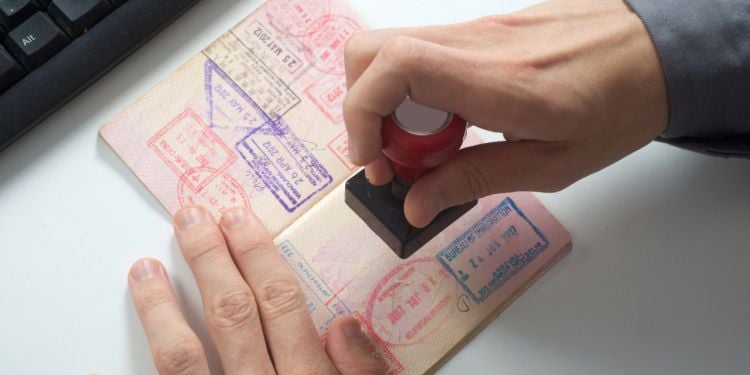
While entering the Netherlands can be simple, it may take some time for approval from the appropriate authorities if you're not an EU or EAA citizen. Because of this, as soon as you know you want to come to this country, you should make the proper arrangements so any delays won't put off your trip. In this article, we'll outline the general visas you'll need to enter the Netherlands. Keep in mind that this is a broad guide, and you most likely will have to check with your Dutch embassy or consulate to get 100% accurate information.
Airport Transit Visa
Perhaps you're only traveling through the Netherlands on a layover; surely, you won't need a visa for this. This is a common misconception, as in some cases, you do indeed need an airport transit visa (also known as an A-visa) to transfer to another flight while at a Dutch airport.
Do note that this visa doesn't allow you to leave the airport, as it's only for you to transfer flights. So even if you have a few hours to spare, you aren't allowed to step outside and explore the Netherlands. This means the airport transit visa doesn't allow you to enter any EU country. It also doesn't guarantee whether or not you can actually fly, even if you've got all the right paperwork. In the end, it's the airline that decides to either let you on the flight or not.
You'll need to check the Visa Advisor to see if you need this visa based on your nationality and travels. However, do note that if you're transferring to fly to another Schengen country or if you're changing planes two times within the Schengen area to go somewhere outside the Schengen area, you'll need to apply for a short-stay Schengen visa instead.
The Schengen Visa
For non-EU citizens (some exceptions apply), you'll need a Schengen visa to enter the Netherlands or any of the other 28 other countries on the list. This is also known as a short-stay visa. The Schengen Agreement first came into existence in 1985 and essentially removed borders for all the European nations that participated. This meant people could move around more freely, and there was less paperwork for the authorities to deal with. This visa allows you to travel freely between these countries for up to 90 days, with the timer resetting after six months.
If you plan on leaving and reentering this area, you should pick the multiple-entry option when you're applying for your visa. Also, if you're traveling to several countries, you should apply at the embassy or consulate of the one that's your "home base" (where you'll be spending most of your time). Otherwise, if you're visiting each equally, you should apply at the embassy or consulate of the one you're visiting first.
If you're from a country where you need a Schengen visa to enter the Netherlands, you can apply through Schengen Visa Info. Because the visa process can take between two to 14 days or more, you should apply as soon as possible. Your local Dutch embassy or consulate may be overloaded, which may make the processing time take even longer.
Extensions for the Schengen Visa
In normal circumstances, you're only allowed to stay in the Schengen Area for 90 days in a 180-day period. However, there are some special circumstances where you can extend it. For example, if you've fallen ill or are injured, or have other situations where you can't leave the Netherlands, then you need to submit an extension application explaining why you aren't able to leave the country.
If your extension's been approved, it's only good for the Netherlands if you've already been in the Schengen Area for 90 days. After that, the maximum extension is another 90 days, with a total of no more than 180 days in the Schengen Area.
There are certain conditions you must meet to be eligible for an extension. First, you need at least €55 per day to pay for your stay. If you don't have this amount, you can have someone sponsor you. You must also have international health insurance that's valid for the duration of your stay in the Schengen Area. You must be able to show that you can cover medical costs (if applicable), whether that's through your insurance policy or some other way.
Other conditions include your passport being valid for at least three months after your updated departure date, no indications of you wanting to live illegally in the Netherlands, you don't pose a threat to public order, and you're not working illegally either.
If you're from Suriname and you're older than 60, then you can extend your visa once per visit. What's great is, you don't even need a special reason! The extension will allow you to travel in the Benelux areas (the Netherlands, Belgium, and Luxembourg).
MVV Visa
The MVV visa (machtiging tot voorlopig verblijf or D-visa) is a long-stay visa; it's between a tourist visa and an official residence permit. Even if you don't need a Schengen visa, you may have to apply for the MVV if you plan on staying in the Netherlands for over 90 days.
If you're from Australia, Canada, Japan, Monaco, New Zealand, Vatican City, the United Kingdom, the United States, South Korea, an EU/EEA member state, or Switzerland, you'll be exempt from the MVV requirement. Also, if you're a family member of someone who's a citizen of an EU/EEA member state or Switzerland, you'll be exempt from getting an MVV visa too.
However, if you do need an MVV visa, you'll be able to apply for an official residence permit at the same time (this is called a Toegang en Verblijf (TEV)). If you don't need one, then you can apply for a residence permit directly.
There are several purposes for the MVV visa, such as studying or working. The requirements to get this visa will be different for each purpose, so you'll need to do some additional research to make sure you meet them before applying. However, there are some common requirements for everyone, such as having a valid passport and not having a criminal record. The IND has more information on the requirements everyone must meet to get an MVV visa.
You can either apply on your own or have your sponsor do it for you, if applicable. This can be a family member, school, or employer. You must apply to the Dutch embassy or consulate in either your home country or country of permanent residence. You can always use the Dutch embassy in a neighboring country if you don't have one in your own.
The MVV is actually a sticker that goes in your passport. Once you receive it, it expires within 90 days, so make sure you make travel plans quickly to get to the Netherlands within 90 days. If it expires before you travel, you'll have to reapply.
Orange Carpet Visa Facility
The Orange Carpet Visa Facility is a business visa. It's ideal for business people who regularly travel to the Netherlands for business purposes and need a Schengen visa. Exactly who qualifies for this visa will depend on which country your business is based in, and the procedures will vary from country to country.
With an Orange Carpet Visa Facility, you'll enjoy several benefits. For example, you won't need to submit as many documents to get a visa, and you'll receive it quicker as well. Not only that, but you only need to apply for this visa in person every 5 years if your biometrics are still in the database.
To apply for an Orange Carpet Visa Facility, you should ask the Dutch embassy or consulate-general in your home country. In some countries, you don't need to hand your application in with an appointment. You can even use the VIP counter.
Currently, the countries that have an Orange Carpet Visa Facility include Brazil, Canada, China, Cuba, Egypt, Ethiopia, India, Indonesia, Jordan, Kenya, Kosovo, Lebanon, Morocco, Pakistan, the Philippines, Qatar, Saudi Arabia, Singapore, Slovakia, South Africa, Tanzania, Thailand, Turkey, United Arab Emirates, the United Kingdom, the United States, Vietnam.
Caribbean Visas
Did you know that some Caribbean islands are Dutch territories? This means that you'll need a Caribbean visa if you plan on visiting any of them in the future. A Caribbean visa will give you access to Aruba, Bonaire, Curacao, Saba, St. Eustatius, and St. Maarten.
Just like with regular Dutch visas, there are both short-stay (under 90 days) and long-stay (over 90 days) visas for these Caribbean islands. Netherlands Worldwide has more information if you're interested in the details.
Information for British Citizens
Prior to Brexit, British citizens enjoyed the freedom of movement, as the United Kingdom was part of the EU. This meant that if you traveled to the Netherlands, you didn't need to apply for visas.
However, Brexit was voted through, and the UK left the EU on 31 January 2020. While there was a transition period, new rules officially came into place on 1 January 2021. What this means is for the foreseeable future (unless the UK is readmitted into the EU), all British citizens will be treated as non-EU citizens, which means you'll have to follow the same procedures as everyone else to get legal entry into the Netherlands. In general, you won't need a visa to travel to the Netherlands and the Schengen area if you're staying for 90 days or less in a 180-day period and you're visiting as a tourist.
General visa requirements for the Netherlands
In general, you need to have €55 per day to cover your stay in the Netherlands. You'll be asked to prove you're financially sufficient for your entire stay.
Also, your passport needs to have at least two blank pages. The passport can't be older than 10 years either.
Non-EU citizens will be asked to supply contact details of their hosts if they've been invited to the nation. And EU citizens still have to ask for prior authorization to travel to the Netherlands, even if they don't have entry visa requirements. You can get this authorization through ETIAS (the European Travel Information and Authorization System).
Children under the age of six won't have to pay visa fees. Those between six to 12 years old will pay around €45. Otherwise, adults pay around €90 in fees. Make sure you check beforehand so you know exactly how much you'll need to pay.
Visa sponsorships in the Netherlands
Not everyone will be able to afford to travel to the Netherlands, especially if they're planning on staying a while. But that doesn't necessarily mean you won't be able to come to this country.
If you have a trusted relative and you're a student or an unemployed or retired person, you can then have this person sponsor your visa. To do so, they need to submit documents that prove they can support you while you're in the Netherlands. They'll also need to submit a sponsorship form.
Unfortunately, only those directly related to you can sponsor you for a visa. You may not use a friend. Other sponsors include educational institutions or recognized employers.
Residence permits in the Netherlands
The first thing you need to do when you arrive is register with your local gemeente (township or city hall), whether you're an EU citizen or not. You'll need to bring your legalized (and translated) birth certificate, as well as an apostilled marriage if your spouse is registering as well. This will establish your arrival in the country and get you your BSN, which is your social security number.
While it's best to start the residence permit application process before you arrive, it may not always be possible. If you're still in your home country, you'll submit your application to the Dutch embassy or consulate. But if you're in the Netherlands, you'll submit it directly to the IND, which is the Dutch immigration service.
Once your residence permit application is processed and approved, you can then make an appointment at your local IND office to pick it up. This residence permit is valid for up to 5 years.
Should your residence permit application be rejected, have peace of mind knowing that you can always appeal it. You can either file an objection or apply for judicial review; just make sure you do it within 28 days. Find more details on what to do on the IND's website.
We do our best to provide accurate and up to date information. However, if you have noticed any inaccuracies in this article, please let us know in the comments section below.








